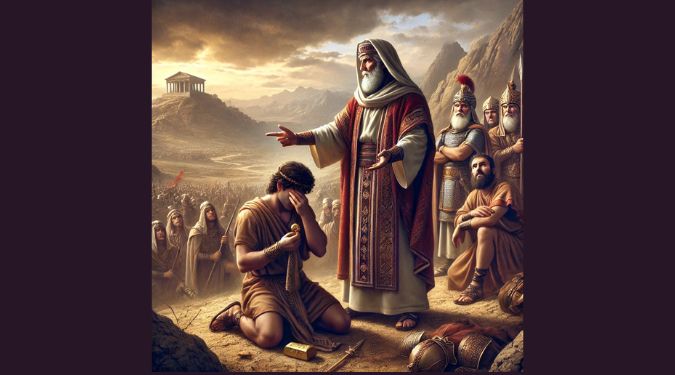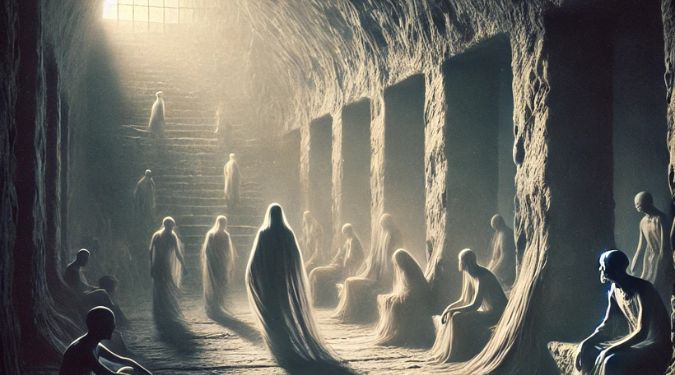In this post I’ll relate a disturbing story from the Book of Joshua story of a Israelite soldier named Achan (pronounced Aw-KAWN) who made a terrible mistake. What I say may not make the story any less disturbing, but we will hear a great spiritual lesson related to it from St. John of the Cross.
First Battle of Ai
Our story begins with the Israelite’s first attempt to capture the city of Ai (pronounced AH-ee). We read about this in the seventh chapter of the Book of Joshua. Joshua sent up some spies to check out the city and these spies came back and told Joshua that they’d only need two to three thousand men to take the city. The spies, unfortunately, drastically underestimated the effort, and the small Israelite contingent was defeated badly. Joshua was despondent. Reading from verse 10:
The Lord said to Joshua, “Arise, why have you thus fallen upon your face? Israel has sinned; they have transgressed my covenant which I commanded them; they have taken some of the devoted things; they have stolen, and lied, and put them among their own stuff. Joshua 7:10-11 RSVCE
In my post, On Violence in the Old Testament, I explained that harem ( חָרַם pronounced khaw-RAM) was a policy mandated by God in the Book of Deuteronomy for the conquest of Canaan. חָרַם is the Hebrew verb meaning “to devote”, and in this context it means the total destruction of every inhabitant in the city and the destruction or appropriation of their possessions. It often included the destruction of all booty or valuables taken in the conquest of a city. This rule seemed to have at least two purposes:
- In a time when loot or the spoils of war provided an incentive for soldiers, this took away greed as a motivator for soldiers for taking the Promised Land
- It prevented the soldiers from taking the idols from a captured city into their own homes.
Back to our story. In order to find the culprit, God ordered Joshua to choose a tribe by lot, then a clan by lot, then a family head by lot. Achan was chosen and Joshua interogated him rather gently:
“My son, give glory to the LORD God of Israel and give praise to him. And tell me now what you have done; do not hide it from me.”
And Achan answered Joshua, “Truly I have sinned against the LORD God of Israel, and this is what I did: when I saw among the spoil a beautiful cloak from Shinar, and 200 shekels of silver, and a bar of gold weighing 50 shekels, then I coveted them and took them. And see, they are hidden in the earth inside my tent, with the silver underneath.”
Joshua then sent me to Achan’s tent, and they found the loot and brought it to Joshua.
And Joshua and all Israel with him took Achan the son of Zerah, and the silver and the cloak and the bar of gold, and his sons and daughters and his oxen and donkeys and sheep and his tent and all that he had. And they brought them up to the Valley of Achor. And Joshua said, “Why did you bring trouble on us? The LORD brings trouble on you today.” And all Israel stoned him with stones. They burned them with fire and stoned them with stones. And they raised over him a great heap of stones that remains to this day. Joshua 7:19-26a
An Allegorical Interpretation
It’s not only the disturbing nature of this story that compels us to find a spiritual sense in it – the senses we discussed in my post, the Senses of Sacred Scripture. First, the primary theme of the Book of Joshua is that the Lord himself fought on behalf of Israel and gave Israel the Promised Land. Secondly, the very name of Achan derives from a Hebrew word for “trouble”, as does the name of the valley in which the story occurs, the Valley of Achor.
At least one saint, Saint John of the Cross, a 16th century Spanish Catholic priest, mystic, Carmelite friar, and a Doctor of the Church, saw a lesson in detachment from this. He mentioned the concept of herem in his famous book, Ascent of Mt. Carmel. There he refers to the Battle of Jericho, but his words could be applied to the first Battle of Ai too:
In the Book of Joshua, again, we have a figure of what has just been said — where we read that God commanded Joshua, at the time that he had to enter into possession of the Promised Land, to destroy all things that were in the city of Jericho, in such wise as to leave therein nothing alive, man or woman, young or old, and to slay all the beasts, and to take naught, neither to covet aught, of all the spoils. This He said that we may understand how, if a man is to enter this Divine union, all that lives in his soul must die, both little and much, small and great, and that the soul must be without desire for all this, and detached from it, even as though it existed not for the soul, neither the soul for it. The Ascent of Mt. Carmel, Chapter XI, 8
St. John of the Cross then quotes St. Paul in his first letter to the Corinthians, chapter 7:
I mean, brethren, the appointed time has grown very short; from now on, let those who have wives live as though they had none, and those who mourn as though they were not mourning, and those who rejoice as though they were not rejoicing, and those who buy as though they had no goods, and those who deal with the world as though they had no dealings with it. For the form of this world is passing away. I Corinthians 7:29-31 RSVCE
St. John goes on to say,
“This the Apostle says to us in order to teach us how complete must be the detachment of our soul from all things if it is to journey to God.”
The catechism confirms these words when it presents the Promised Land as an allegory for heaven or the beatific vision:
Jesus enjoins his disciples to prefer him to everything and everyone, and bids them “renounce all that [they have]” for his sake and that of the Gospel. Shortly before his passion he gave them the example of the poor widow of Jerusalem who, out of her poverty, gave all that she had to live on. The precept of detachment from riches is obligatory for entrance into the Kingdom of heaven. CCC 2544
Works Cited
Catechism of the Catholic Church: Complete and Updated. Random House Publishing Group, 1995.
St. John of the Cross. “Work info: Ascent of Mount Carmel.” Christian Classics Ethereal Library, https://www.ccel.org/ccel/john_cross/ascent.html. Accessed 17 November 2024.



